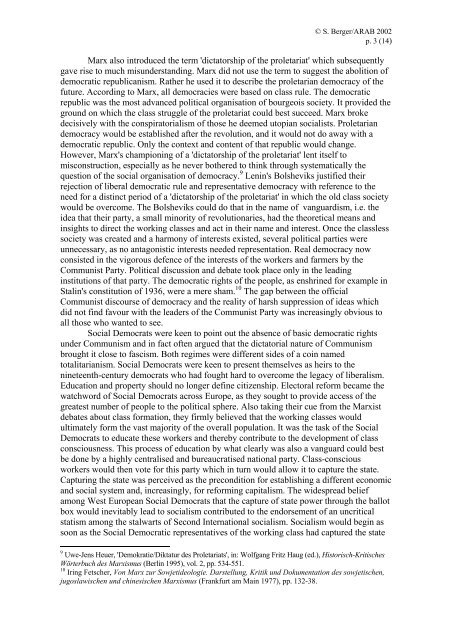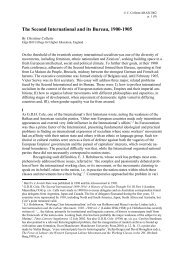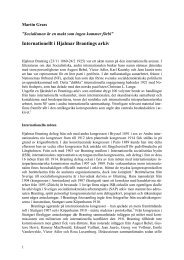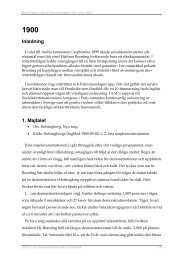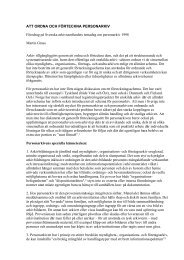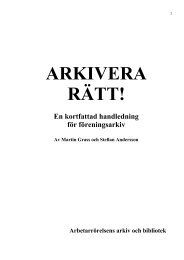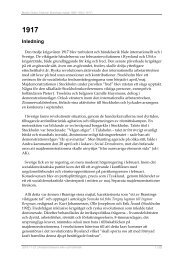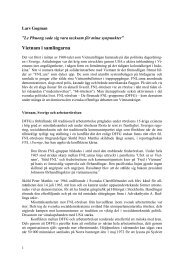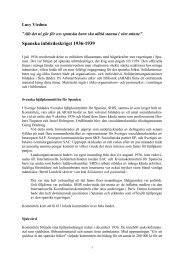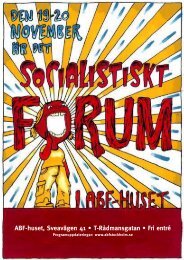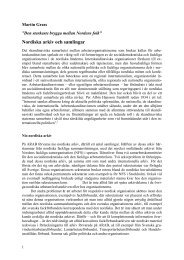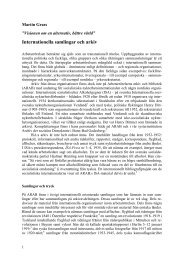Communism, Social Democracy and the Democracy Gap
Communism, Social Democracy and the Democracy Gap
Communism, Social Democracy and the Democracy Gap
Create successful ePaper yourself
Turn your PDF publications into a flip-book with our unique Google optimized e-Paper software.
© S. Berger/ARAB 2002<br />
p. 3 (14)<br />
Marx also introduced <strong>the</strong> term 'dictatorship of <strong>the</strong> proletariat' which subsequently<br />
gave rise to much misunderst<strong>and</strong>ing. Marx did not use <strong>the</strong> term to suggest <strong>the</strong> abolition of<br />
democratic republicanism. Ra<strong>the</strong>r he used it to describe <strong>the</strong> proletarian democracy of <strong>the</strong><br />
future. According to Marx, all democracies were based on class rule. The democratic<br />
republic was <strong>the</strong> most advanced political organisation of bourgeois society. It provided <strong>the</strong><br />
ground on which <strong>the</strong> class struggle of <strong>the</strong> proletariat could best succeed. Marx broke<br />
decisively with <strong>the</strong> conspiratorialism of those he deemed utopian socialists. Proletarian<br />
democracy would be established after <strong>the</strong> revolution, <strong>and</strong> it would not do away with a<br />
democratic republic. Only <strong>the</strong> context <strong>and</strong> content of that republic would change.<br />
However, Marx's championing of a 'dictatorship of <strong>the</strong> proletariat' lent itself to<br />
misconstruction, especially as he never bo<strong>the</strong>red to think through systematically <strong>the</strong><br />
question of <strong>the</strong> social organisation of democracy. 9 Lenin's Bolsheviks justified <strong>the</strong>ir<br />
rejection of liberal democratic rule <strong>and</strong> representative democracy with reference to <strong>the</strong><br />
need for a distinct period of a 'dictatorship of <strong>the</strong> proletariat' in which <strong>the</strong> old class society<br />
would be overcome. The Bolsheviks could do that in <strong>the</strong> name of vanguardism, i.e. <strong>the</strong><br />
idea that <strong>the</strong>ir party, a small minority of revolutionaries, had <strong>the</strong> <strong>the</strong>oretical means <strong>and</strong><br />
insights to direct <strong>the</strong> working classes <strong>and</strong> act in <strong>the</strong>ir name <strong>and</strong> interest. Once <strong>the</strong> classless<br />
society was created <strong>and</strong> a harmony of interests existed, several political parties were<br />
unnecessary, as no antagonistic interests needed representation. Real democracy now<br />
consisted in <strong>the</strong> vigorous defence of <strong>the</strong> interests of <strong>the</strong> workers <strong>and</strong> farmers by <strong>the</strong><br />
Communist Party. Political discussion <strong>and</strong> debate took place only in <strong>the</strong> leading<br />
institutions of that party. The democratic rights of <strong>the</strong> people, as enshrined for example in<br />
Stalin's constitution of 1936, were a mere sham. 10 The gap between <strong>the</strong> official<br />
Communist discourse of democracy <strong>and</strong> <strong>the</strong> reality of harsh suppression of ideas which<br />
did not find favour with <strong>the</strong> leaders of <strong>the</strong> Communist Party was increasingly obvious to<br />
all those who wanted to see.<br />
<strong>Social</strong> Democrats were keen to point out <strong>the</strong> absence of basic democratic rights<br />
under <strong>Communism</strong> <strong>and</strong> in fact often argued that <strong>the</strong> dictatorial nature of <strong>Communism</strong><br />
brought it close to fascism. Both regimes were different sides of a coin named<br />
totalitarianism. <strong>Social</strong> Democrats were keen to present <strong>the</strong>mselves as heirs to <strong>the</strong><br />
nineteenth-century democrats who had fought hard to overcome <strong>the</strong> legacy of liberalism.<br />
Education <strong>and</strong> property should no longer define citizenship. Electoral reform became <strong>the</strong><br />
watchword of <strong>Social</strong> Democrats across Europe, as <strong>the</strong>y sought to provide access of <strong>the</strong><br />
greatest number of people to <strong>the</strong> political sphere. Also taking <strong>the</strong>ir cue from <strong>the</strong> Marxist<br />
debates about class formation, <strong>the</strong>y firmly believed that <strong>the</strong> working classes would<br />
ultimately form <strong>the</strong> vast majority of <strong>the</strong> overall population. It was <strong>the</strong> task of <strong>the</strong> <strong>Social</strong><br />
Democrats to educate <strong>the</strong>se workers <strong>and</strong> <strong>the</strong>reby contribute to <strong>the</strong> development of class<br />
consciousness. This process of education by what clearly was also a vanguard could best<br />
be done by a highly centralised <strong>and</strong> bureaucratised national party. Class-conscious<br />
workers would <strong>the</strong>n vote for this party which in turn would allow it to capture <strong>the</strong> state.<br />
Capturing <strong>the</strong> state was perceived as <strong>the</strong> precondition for establishing a different economic<br />
<strong>and</strong> social system <strong>and</strong>, increasingly, for reforming capitalism. The widespread belief<br />
among West European <strong>Social</strong> Democrats that <strong>the</strong> capture of state power through <strong>the</strong> ballot<br />
box would inevitably lead to socialism contributed to <strong>the</strong> endorsement of an uncritical<br />
statism among <strong>the</strong> stalwarts of Second International socialism. <strong>Social</strong>ism would begin as<br />
soon as <strong>the</strong> <strong>Social</strong> Democratic representatives of <strong>the</strong> working class had captured <strong>the</strong> state<br />
9 Uwe-Jens Heuer, 'Demokratie/Diktatur des Proletariats', in: Wolfgang Fritz Haug (ed.), Historisch-Kritisches<br />
Wörterbuch des Marxismus (Berlin 1995), vol. 2, pp. 534-551.<br />
10 Iring Fetscher, Von Marx zur Sowjetideologie. Darstellung, Kritik und Dokumentation des sowjetischen,<br />
jugoslawischen und chinesischen Marxismus (Frankfurt am Main 1977), pp. 132-38.


